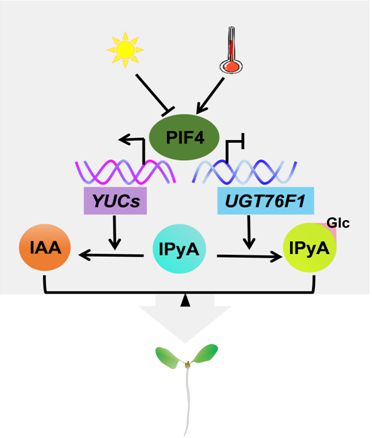Recently, Prof. Hou Bingkai's group from the School of Life Sciences,Shandong University, made new progress in the research of plant hormone glycosylation. Related results have been published on the international top journal PNAS entitled "IPyA glucosylation mediates light and temperature signaling to regulate auxin-dependent hypocotyl elongation in Arabidopsis", as aPNAS Direct Submission. The first author is Ph.D. candidate Chen Lu from the School of Life Sciences, and Prof. Hou is the corresponding author.

Auxin is a class of plant hormone that plays a crucial role in the life cycle of plants, particularly in the growth response of plants to ever-changing environments. Since the auxin responses are concentration-dependent and higher auxin concentrations might often be inhibitory, the optimal endogenous auxin level must be closely controlled. However, the underlying mechanism governing auxin homeostasis remains largely unknown. In this study, a UDP-glycosyltransferase (UGT76F1) was identified fromArabidopsis thaliana, which participates in the regulation of auxin homeostasis by glucosylation of indole-3-pyruvic acid (IPyA), a major precursor of the auxin indole-3-acetic acid (IAA) biosynthesis, in the formation of IPyA glucose conjugates (IPyA-Glc). In addition, UGT76F1 was found to mediate hypocotyl growth by modulating active auxin levels in a light- and temperature-dependent manner. Moreover, the transcription of UGT76F1 was demonstrated to be directly and negatively regulated by PIF4, which is a key integrator of both light and temperature signaling pathways. This study sheds a new light on the trade-off between IAA biosynthesis and IPyA-Glc formation in controlling auxin levels, demonstrating that IPyA-Glc formation is a key "watershed" event that controls auxin biosynthesis. This research is an important breakthrough in the field of plant hormones and reveals a key regulatory mechanism for plant growth adaptation to environmental changes through the glucosylation of auxin precursor IPyA.
Prof. Hou's group has long been engaged in the study of biological function and regulation mechanism of plant molecular glycosylation. In recent years, this group has made a series of progress in this field and published papers with significant influence in New Phytol(2012),The Plant J(2016),The Plant J(2017),Plant Physiol(2018), and Plant Physiol(2019). This publication in PNAS is another advance made by Hou's group in the field of plant molecular glycosylation. Prof. Xiao Langtao and Dr. Tong Jianhua from Hunan Agricultural University contributed to this work.
This work was supported by grants from the National Natural Science Foundation of China.
Article link:https://doi.org/10.1073/pnas.2000172117
Source: the School of Life Sciences
Written by: Chen Lu
Edited by: Xie Tingting